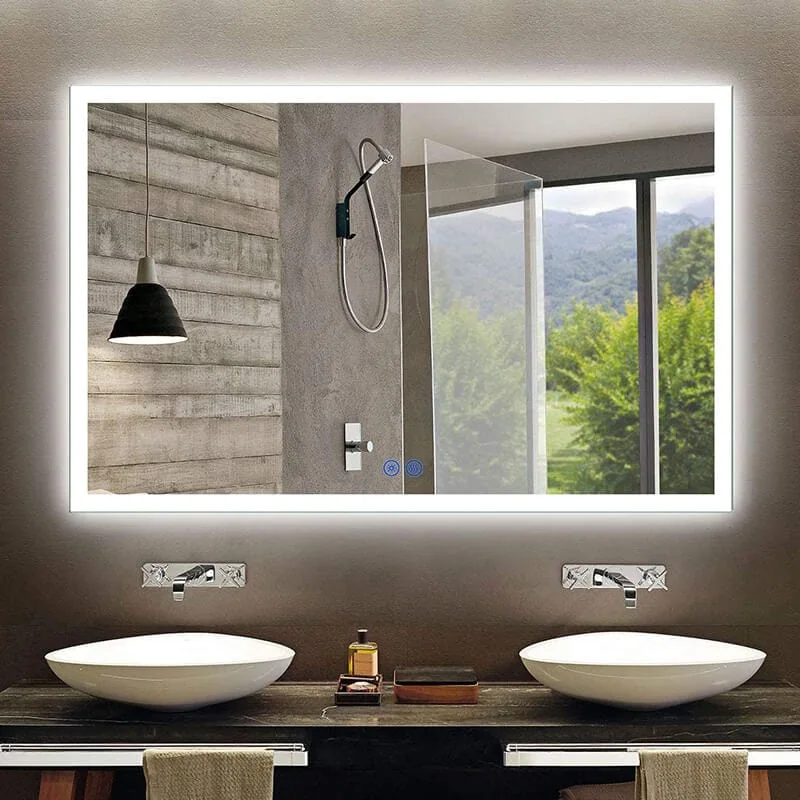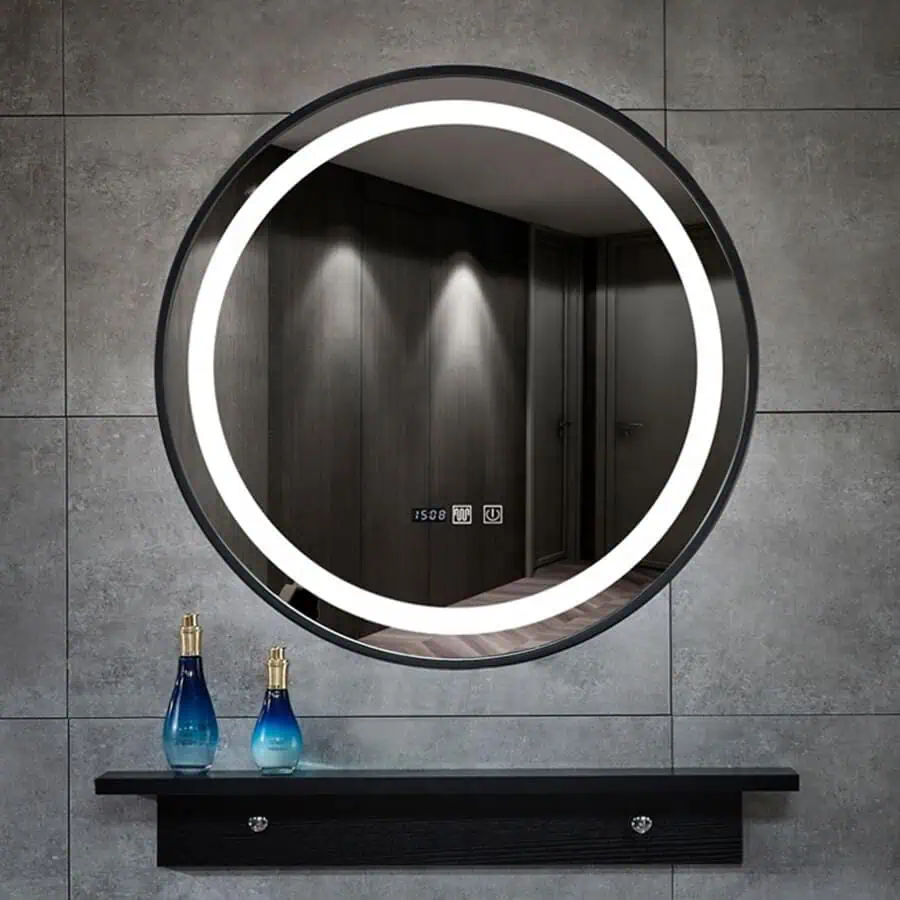Choosing the right mirror thickness might be a difficult issue. A thin mirror can break quickly, yet a thicker mirror might be excessively weighty. Let’s look at what makes a mirror the best match for your requirements!
The standard thickness of mirrors typically ranges from 3mm to 6mm. The most common mirror thickness for home use is 1/4-inch (6mm), as it balances durability and clarity. Thicker mirrors are often used for larger applications or where additional strength is needed.
Now that you have a fundamental grasp of mirror thickness, let’s study how the thickness effects various types of mirrors, including frameless choices and LED mirrors.

Table of Contents
ToggleWhy Does Mirror Thickness Matter?
The thickness of a mirror has a vital impact in its overall performance. It impacts everything from strength and weight to the clarity of the reflection. Thicker mirrors, such as 6mm mirrors, are typically more durable and less likely to break or distort over time. Thickness guarantees that huge mirrors, such as those used in LED bathroom mirrors or backlit bathroom mirrors, can support their own weight while still resisting external pressure.
Mirror glass thickness has a direct influence on its simplicity of installation. For example, 3mm mirrors are lighter and quicker to install, making them ideal for smaller vanity mirrors with lights. Larger mirrors, such as backlit mirrors or wall mirrors with lights, require a thicker mirror to offer stability and hold the weight of the glass and lighting.
The quality of mirrors is highly related to thickness. Thicker mirrors have a flatter surface, which causes less distortion in the reflection. Thicker mirrors are often the ideal option for situations where clarity is critical, such as magnifying mirrors with lights or LED mirrors.
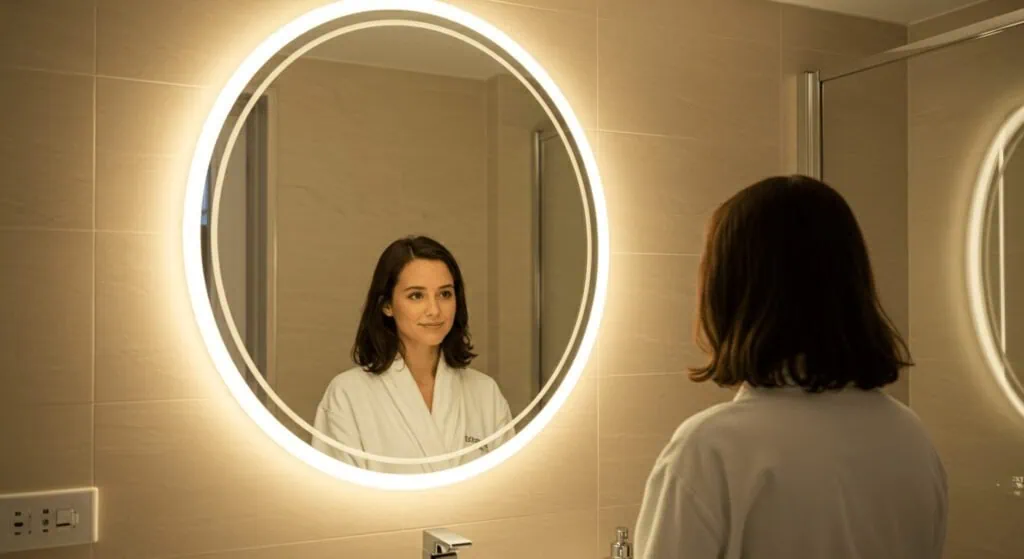
What Thickness is Best for Bathroom Mirrors?
Bathroom mirrors need to be able to withstand moisture, regular use, and the occasional bump. The mirror thickness standards for bathroom mirrors reflect these needs. For bathroom mirrors, a thickness standard of 6mm is often used. At this thickness, the mirrors are durable enough to be safe in a bathroom, but not so thick that they are visually unattractive. Thicker mirrors are beneficial in a bathroom environment where the mirror needs to withstand humidity and regular use.
If you opt for an LED bathroom mirror, thicker mirrors, like the 6mm mirror, are important as they help insulate and protect the built-in LEDs from moisture. The added thickness gives the LED setup a more stable base and helps the mirror last longer, especially when it’s subjected to the consistently high humidity found in most bathrooms.
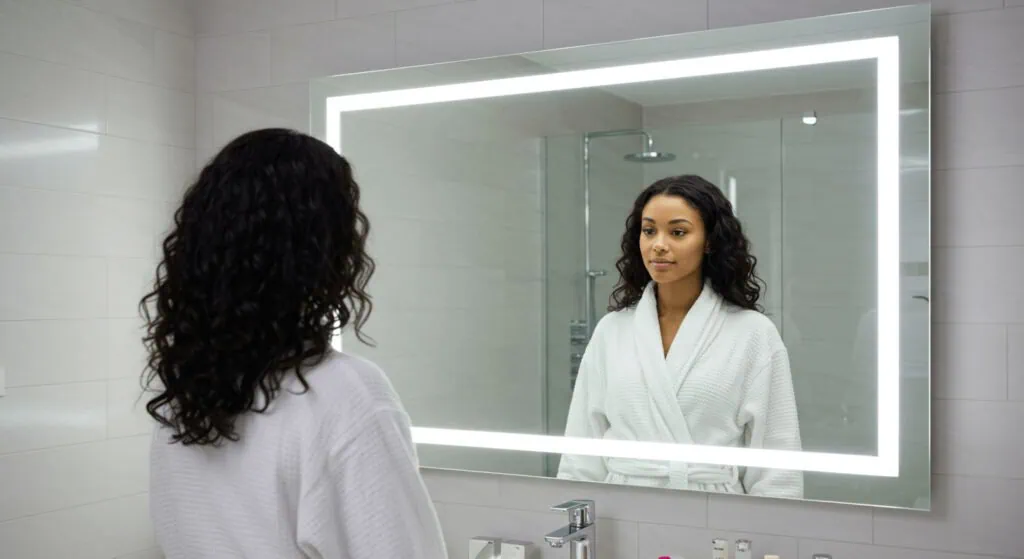
Is There a Thickness Difference for Larger Mirrors?
When installing larger mirrors, you need to consider mirror thickness. For larger mirrors, such as a vanity mirror with built-in LED lighting, a 6mm mirror is essential. At this thickness, the mirror will not warp over time, and it will stay steady with the additional weight of the built-in lighting system. Whether it’s a backlit mirror or a wall-mounted mirror with lights, thicker mirrors will keep a higher quality longer than their thinner counterparts.
The quality of the reflection is also better with thicker mirrors, especially over larger expanses. If you’re installing a mirror with lights in a large room, a 6mm mirror will provide even light distribution and keep the reflection clear and undistorted.
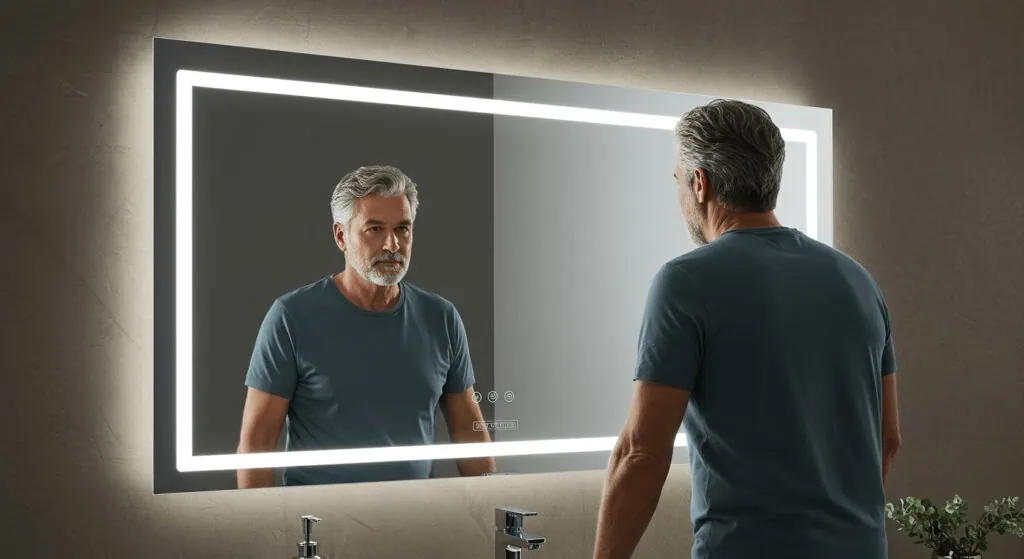
How Does Mirror Thickness Affect Weight?
The thickness of the mirror significantly influences its weight, which can impair both installation and performance. Smaller mirrors, such as LED mirrors or light-up cosmetic mirrors, benefit from thinner mirror glass. 3mm mirrors are frequently lightweight and quick to install, making them ideal for light-duty applications.
On the other hand, thicker mirrors, such as 6mm mirrors, are significantly heavier and more stable. These mirrors are best suited for backlit bathroom mirrors or large LED mirrors that require additional structural support. A thicker mirror will be more resistant to vibrations and stay in position once installed, reducing mishaps or tilting over time.
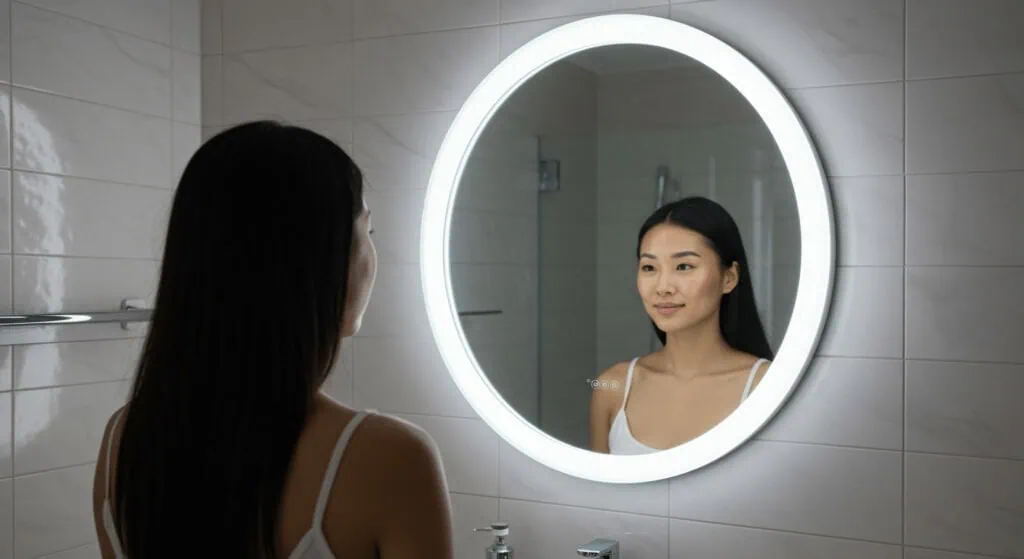
How Thick Should a Frameless Mirror Be?
Frameless mirrors are popular in homes and business. You should carefully choose frame thickness and overall mirror glass thickness to ensure both strength and aesthetics.
When it comes to frameless mirrors, 4mm thickness is the most common choice. It’s a good compromise between strength and lightweight properties. It has enough strength for most applications without being too bulky and heavy. However, if you’re looking for a mirror with lights like a vanity mirror with lights, thicker mirrors such as 6mm may be a better fit.
Although you might get away with using 3mm mirrors for decorative, smaller frameless mirrors, when it comes to larger frameless mirrors—especially those that are part of a bathroom mirror with lights or LED vanity mirror—a thicker glass is much better. With a bit of extra thickness, you’re getting a mirror that is stable, durable, and won’t distort over time.
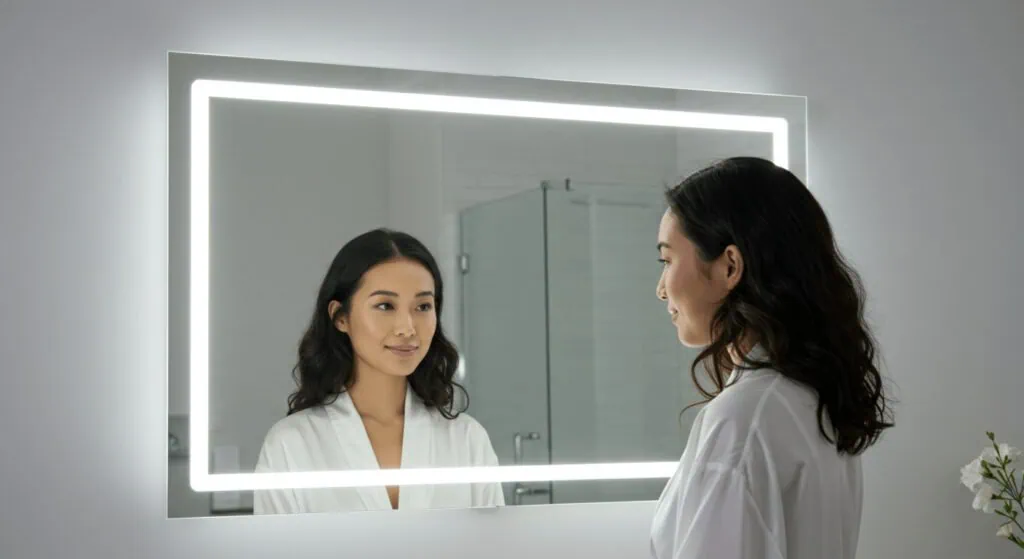
Is a 3mm Mirror Good?
A 3mm mirror is a great choice and is good for small, lightweight applications. If you are looking at a larger mirror or something that is going to be more heavy-duty, you may want to consider going with a thicker mirror. Where do 3mm mirrors fit in? They are perfect for decorative mirrors, light up vanity mirrors, and illuminated mirrors. They’re also good for small mirrors or situations where the risk of a bump or distortion is low.
The downside is 3mm mirrors don’t have the same level of durability as the thicker options. They are more likely to warp, crack or have issues when dealing with pressure or upon installation. So, when we start to talk about larger mirrors, like LED bathroom mirrors or backlit mirrors, you’re going to want to have thicker glass simply for the added strength.
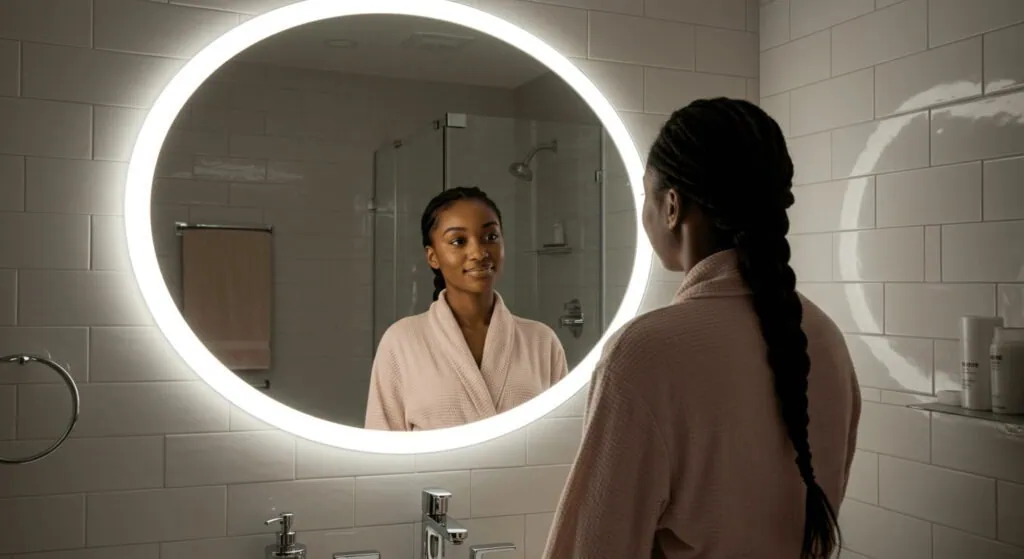
Is a 4mm Mirror Good?
4mm mirrors are a flexible and often used thickness. It strikes a compromise between strength and cost-effectiveness, making it ideal for a variety of applications. For mid-sized mirrors such as bathroom mirrors and backlit bathroom mirrors, 4mm mirrors are an excellent choice. They outperform 3mm mirrors in terms of durability while remaining lightweight enough for easy installation.
For something like a smaller or standard-sized LED mirror, a 4mm mirror is likely your best choice. It’s going to be strong enough to put up with everyday use, but it’s not going to be as heavy as a 6mm mirror, making it a great option for an illuminated mirror or a light-up cosmetic mirror.
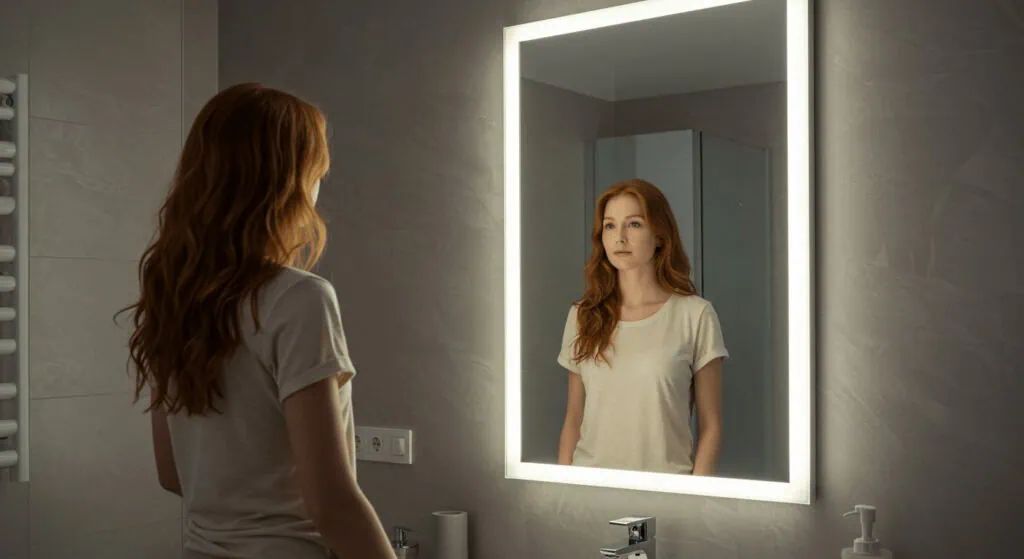
How Thick is a 2-Way Mirror?
2-way mirrors, used in security and surveillance applications, typically have different thickness requirements because of how they’re used. However, most 2-way mirrors are going to be between 4mm to 6mm in thickness. This allows for a clear reflection but also gives it the ability to hold up to whatever demands it’s faced down.
A 2-way mirror is often used in areas like observation rooms or spaces where you might have an interrogation. The thicker glass allows the mirror to serve its purpose and do what it’s supposed to do without jeopardizing the security or the privacy of the area where it’s being used.
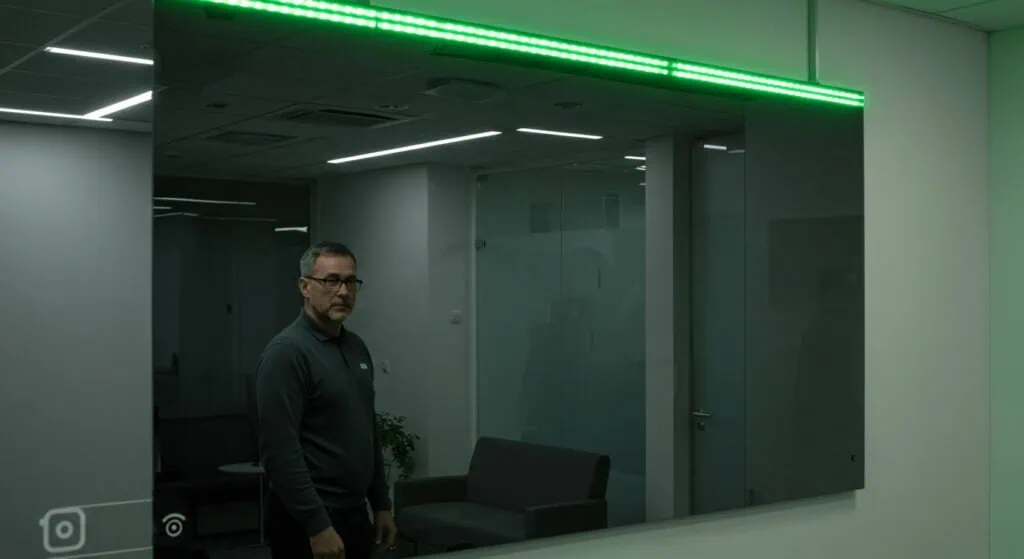
What is the Difference Between 4mm and 6mm Mirror?
The difference between a 4mm mirror and a 6mm mirror is going to be in durability, weight and, of course, cost. A 6mm mirror is significantly more durable than a 4mm mirror, and that’s important when you’re talking about high traffic areas or large mirrors, such as a LED vanity mirror or a backlit bathroom mirror. The thicker glass is going to provide a lot flatter, truer surface, and it’s going to be less apt to bend or warp.
Now, while a 6mm mirror might be better for a larger application, it’s more expensive, and it’s definitely heavier than a 4mm mirror. So, depending on what your project is, you’ve got to weigh the choice of having something that’s going to be more durable and a little bit more expensive versus a little bit lighter and less expensive.
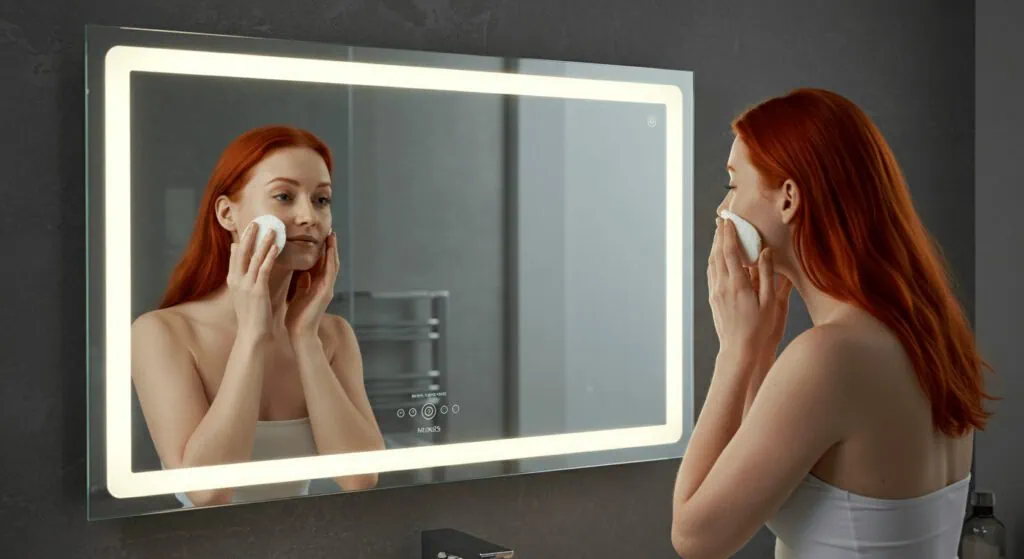
Are Thicker Mirrors More Accurate?
A common question when choosing a mirror is if thicker mirrors provide more accurate reflections. Thicker mirrors, such as those with a 6mm thickness, are more stable and resistant to distortion. This can provide more precise reflections, particularly in bigger mirrors such as vanity mirrors with LED lighting or LED bathroom mirrors.
The thickness regulations for mirrors have a significant impact on their quality. Thicker mirrors are flatter, improving the overall accuracy of the reflection. If you want the greatest quality mirrors, use thicker choices wherever feasible.

How Do I Choose a High-Quality Mirror?
Choosing a high-quality mirror necessitates careful consideration of numerous criteria, such as glass mirror thickness, durability, and intended application. The greatest quality mirrors are built with thicker glass, such as 6mm mirrors, to provide stability over time. Furthermore, a mirror with lights may improve the overall look and functionality of the mirror, particularly vanity mirrors or LED mirrors.
Look for a mirror that is durable and will not warp or crack. The glass thickness should match what you’re going to use the mirror for, whether it’s a bathroom mirror with lights or a backlit mirror. Thicker mirrors are going to give you a better long-term value because they’re going to perform better over the life of the mirror.
Summary
Pick the right thickness, and you’re going to get the durability and performance you need. Whether you need a 6mm mirror for your LED bathroom mirror or a 4mm mirror for a light up vanity mirror, the right mirror thickness will make a difference in performance and appearance.


